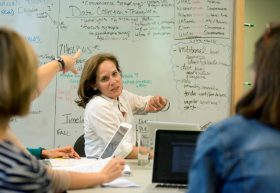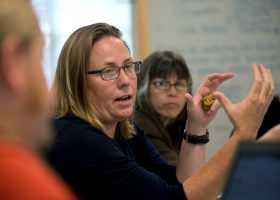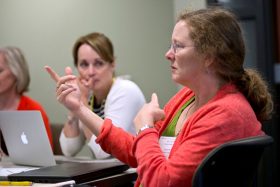Professors from 26 colleges and universities were on campus July 13-18, 2014, for a research program hosted by the Center for Engaged Learning.

[/caption]Professors and college administrators with a commitment to undergraduate research visited Elon University from around the world in July for the first of three summers in which they will together study some of the best practices for mentoring students.
The university’s 2014-2016 Center for Engaged Learning Seminar on Mentoring Undergraduate Research brought to Elon more than 30 professors from 26 institutions of higher learning in five nations. The group will meet for one week each summer through 2016 as teams work on research projects that look for traits common to successful mentors and programs.
Elon University professors Paul Miller and Maureen Vandermaas-Peeler are co-leading the seminar with Laura Behling, vice president for academic affairs and dean of the college at Knox College, and W. Brad Johnson, a professor of psychology in the Department of Leadership, Ethics and Law at the United States Naval Academy and a faculty associate in the Graduate School of Education at Johns Hopkins University.

[/caption]Undergraduate research has become ubiquitous in American higher education, Behling said. Through their seminar involvement, participants will strengthen their abilities to help colleagues grow as mentors while identifying best practices for fostering undergraduate research across disciplines.
“Like all good academics, we want to make sure that what we’re doing is effective and contributing to student learning,” she said. “In some ways this is a classic academic exercise. But we’re also a group of really motivated people who want to do our best for students.”
For example, projects will explore ways to foster diversity within the ranks of undergraduate research programs; identify salient practices and shared characteristics of award-winning mentors; address ways to better prepare graduate students for mentoring roles in their first faculty positions; and determine practices for supporting individual identity formation through undergraduate research.
Associate Professor Jessie Moore, the associate director of the Center for Engaged Learning, said the research teams hope to share their findings at conferences, in journal articles and edited collections, and through the development of tools to share with other mentors.

[/caption]“Undergraduate research is such a high-impact practice and one we can’t easily ‘scale up’ as much as we’d like, but if we know more about what works in mentoring, we can look to replicate practices,” she said. “Undergraduate research won’t be appropriate for every student. We just want to make sure it’s available to more students.”
The 2014-2016 seminar is the third such program sponsored by the Center for Engaged Learning. Previous research seminars have explored ways to teach democratic thinking, and how writing learned in the classroom is used in other settings like internships or the workplace.


